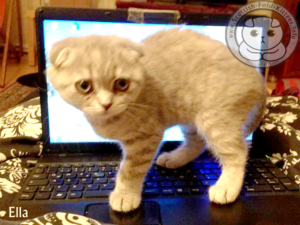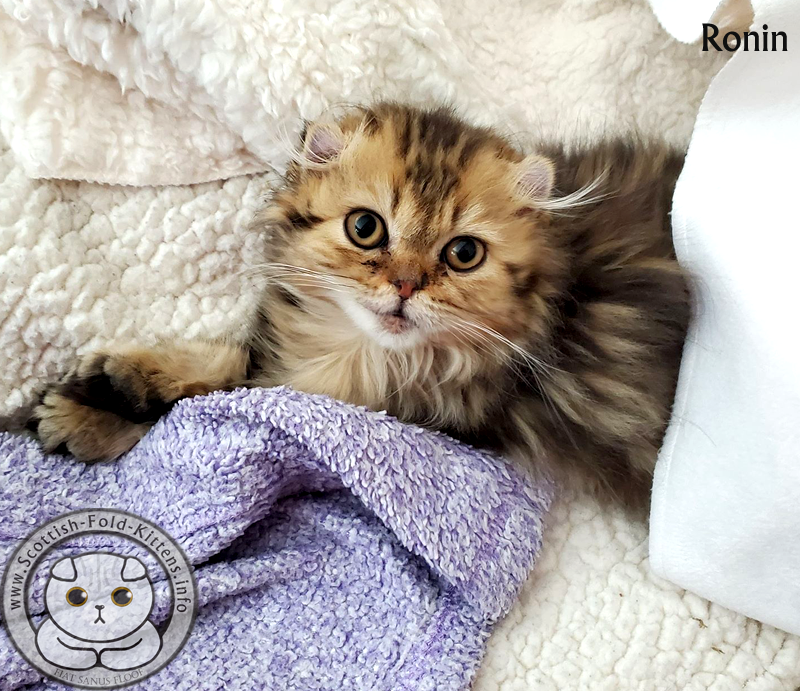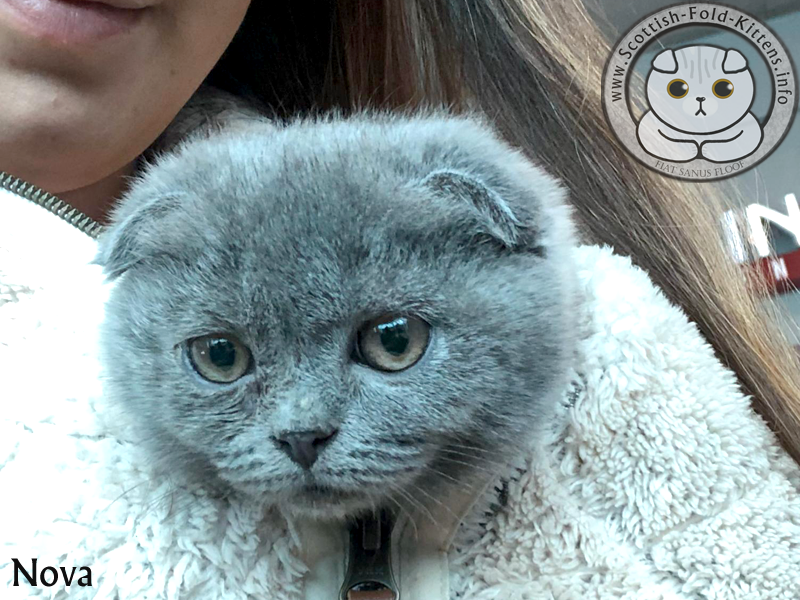We have seen from the Poll Results that the chances of getting a Scottish Fold with hereditary issues is unfortunately very high: about 2 in 5 for a kitten from a Backyard Breeder (40%) and 1 in 4 for a kitten with pedigree papers from an actual Fold breeder (27%).
This questionnaire is here to help you improve your odds of getting a healthy kitten that has been screened for genetic issues. It serves as a guide when choosing a breeder. Please see Ronin’s story to get an idea of what some so-called breeders are capable of.
If all breeders would do all of the things that are asked on this questionnaire and employ selective breeding, I am convinced that the health of the breed as a whole could be greatly improved. But it is up to YOU – the buyer – to ask the right questions and only purchase kittens from responsible breeders. I call it selective buying.
You can download the Scottish Fold Breeder Questionnaire as a PDF at the end of this page. Go directly to the PDF download.
If you are hoping to get a Scottish Fold kitten who will grow up to be a healthy, well-adjusted member of your family for many years to come, it is up to you and you alone to choose the right breeder. This is going to be someone who cares enough about the health of the breed that they invest their time and money into getting their animals tested – and are able to prove it! This is your best chance of getting a strong and vital cat, but please be aware that even with the best breeder, there is never a 100% guarantee.
My tip: Find a good breeder – someone who is a member of a reputable association, someone who knows their stuff and is known on the cat show circuit. Or someone who is highly recommended in an online community, such as in a large Facebook group with hundreds of members. Because these are the breeders who have accountability for their actions. People know who they are and they have a reputation to lose. You should contact other members of the group privately who have bought kittens from them and get the real story.
Always ask to view both of your Foldie’s parents – in advance via video chat before you commit to buying your kitten. Your kitten should live with its mother and siblings until adoption day – at the age of at least 12 weeks, better 14 or 16 weeks. Look for that one parent has straight ears and that none of the cats are kept in cages.
If you feel unsure about a particular breeder, please join the Facebook Group Scottish Fold Info Community for support. 💜
First, you need to know some things about the cattery in order to make an informed decision:
Information about the Cattery
| Name of Cattery: | __________________________________ |
| Name of Contact Person: | __________________________________ |
| Website, Email Address, Additional Contact Info, such as WhatsApp: | __________________________________ |
| Location of Cattery: | __________________________________ |
| Region of Delivery: | __________________________________ |
| Size of Cattery | |
| Number of Cats in Breeding Program: | _____ |
| Number of Litters per Year: | _____ |
| Year Established: | _____ |
| Number of Litters to Date: | _____ |
| Prices for Cats as Pets: • Fold Kittens: • Straight Kittens: • Older Cats: | __________ __________ __________ |
| Is it possible to get on a Waiting List? | Yes: 🔲 No: 🔲 |
| If Yes, approx. Waiting Time currently: | __________________________________ |
| Brief description of the Cattery’s cats (Short Hair or Highland Fold, primary colors bred): | __________________________________ __________________________________ __________________________________ __________________________________ |
| Cattery’s motivation for breeding Scottish Fold Cats: | __________________________________ __________________________________ __________________________________ __________________________________ |
| Any additional Information the Cattery would like to include/References: | __________________________________ __________________________________ __________________________________ __________________________________ |
Information about the Cattery’s Standards and Practices:
If you do not ask any other questions, please make sure that the Cattery answers all of the following questions and provides documentation wherever possible:
| • Member of the following Association(s): | __________________________________ |
| All Breeding Cats: | |
| …have been shown: | Yes: 🔲 No: 🔲 |
| Of those currently in the Cattery’s breeding program, Name of Cat/Highest Achievement: | __________________________________ __________________________________ __________________________________ |
| …have been tested for: | |
| • Gene Test for Straights: | Yes: 🔲 No: 🔲 |
| • Blood Group: – – – – – Please enter here: | Yes: 🔲 No: 🔲 __________________________________ |
| • Blood Panel performed shortly before breeding? | Yes: 🔲 No: 🔲 |
| • FeLV/FIV: | Yes: 🔲 No: 🔲 |
| • PKD: – – – – – Type of test, at what age(s): | Yes: 🔲 No: 🔲 __________________________________ |
| • HCM: – – – – – Type of test, at what age(s): | Yes: 🔲 No: 🔲 __________________________________ |
| • OCD (Folds only): – – – – – Type of test, at what age(s): | Yes: 🔲 No: 🔲 __________________________________ |
| • HD (Hip Dysplasia): – – – – – Type of test, at what age(s): | Yes: 🔲 No: 🔲 __________________________________ |
| Any additional Tests, Standards or Precautions the Cattery would like to mention: | __________________________________ __________________________________ __________________________________ |
| PLEASE PROVIDE COPIES OF ALL TESTS!!! | |
| Have there been health issues with any of the kittens from your Cattery? If so, please describe briefly and include what steps have been taken to avoid these issues in the future: | __________________________________ __________________________________ __________________________________ __________________________________ __________________________________ |
All Available Kittens or Cats from the Cattery:
| • …come with pedigree papers at no extra charge: | Yes: 🔲 No: 🔲 |
| • …have been spayed or neutered: – – – – – At what age: | Yes: 🔲 No: 🔲 __________________________________ |
| • …have been vaccinated: – – – – – Please list vaccinations at what ages (e.g. Purevax RCP/8, 12, 16 w): | Yes: 🔲 No: 🔲 __________________________________ __________________________________ |
| • …have been dewormed: – – – – – How often and which medicinal product was used: | Yes: 🔲 No: 🔲 __________________________________ __________________________________ |
| • …have been microchipped: | Yes: 🔲 No: 🔲 |
| • Kittens can move to their new home at the age of: | _____ weeks* |
*Please note a kitten should not be separated from its mother before the age of 12 weeks minimum. A Finnish study shows that at least 14 weeks is better (less aggressive behavior). Read more
| • …are familiar with the following kinds of foods: | wet food: 🔲 dry food: 🔲** raw meat: 🔲 |
**Please note that dry food is a convenience product comparable with fast food. It is not species appropriate and will damage your cat’s health long term (causing diabetes, kidney disease…). It’s a myth that it cleans their teeth since cats tend to crack and swallow. Read more
| • Will the breeder be available for questions after adoption: | Yes: 🔲 No: 🔲 |
A responsible breeder wants to make sure that their kittens will be placed in a good home and will have some questions for you, too. The third section lists examples of things a cattery may stipulate before you can adopt one of their kittens or cats.
A Cattery’s Requirements for the New Home
A breeder may (and should!) also have a set of requirements which you will need to agree to before you are allowed to take home one of their kittens or cats.
- The conclusion of a contract and full payment.
My tips:
Be aware that some forms of payment, such as the “Friends and Family” option on PayPal, do not allow you to recoup your deposit even if a contract does not materialize. If possible, choose a method of payment which offers you some consumer protection, as you get when paying with a credit card – even if this means paying a little extra in fees. Ask the breeder about their policy regarding the deposit, in writing.
Do not sign a contract which waives your state’s “Pet Lemon Law” or any other legal recourse against unethical breeders. It’s not normal to include such language in a contract and anyone who does should not be trusted. This is another red flag. 🚩 If they are not willing to strike out this wording where both parties initial the change, WALK AWAY.
- The new cat may not be bred and may need to be altered after arrival.
- If a cat cannot stay with you for some reason, you may have to notify the breeder before finding a new home for them.
- A home visit may be required by the breeder.
If you live far away, ask if a tour via video chat or by a representative chosen by the breeder is possible. This is also your chance to see your kitten together with its mother and siblings. If they are in a cage, do not give this breeder your money! - Because cats are actually social animals, a breeder may require that other cats be present or planned in the new home. And if this is the case, they will probably want them to be of a similar age, as well.
- They may want to know if other kinds of pets, such as dogs, live in the new home. Or what to take into consideration if small children are present or planned.
- They may have feeding recommendations, such as to avoid dry food. See above for the connection between pet food and health.**
There might be considerations regarding the new cat’s living area, such as:
- The space available for the people and pets living there as well as an extra room for introducing animals to each other over time
- Places for the cat to retreat to
- Possibilities to climb
- Possibilities to scratch
- An adequate number of litter boxes should be available
Rule of thumb: = the number of cats + 1
Unscented clay litter with active charcoal for odor control is usually accepted by most cats – though more environmentally friendly options should be tried at least, such as litter made from wood fiber - Food dishes should not be plastic since it retains odors (rather glass or ceramic)
- The water dish should be located at least 6 feet (2 meters) from the feeding area. A drinking fountain is always nice to have. 😺
They may ask questions to ensure the cat will receive adequate care:
- The number of hours the cat will be alone per day
- Plans for the cat’s care during vacations
- If the cat will have health insurance or if savings is available for unexpected illnesses, including costly operations
- If a local vet has been chosen and on what basis
- If you agree to carry out any additional vaccinations or procedures, e.g. deworming or altering, if required
If a breeder is not interested in knowing anything about you or their kitten’s future living situation, other than that you can pay the purchase price, this is a red flag. 🚩
It indicates that all they care about is getting the money and what happens to their kitten afterwards doesn’t concern them. But if a breeder has invested time and effort into their animals, they will also want to know that they are going to a good home and will be well taken care of for the next 15 years (best case). Please don’t be offended if they also want some sort of proof that what you say is true, such as a home visit or a tour via video chat. This only shows that they are selective – and it’s a good sign! 👍
My tip: When adopting an animal, our motto should be: Trust is good, but verification is better! And it’s a two-way street. ↔️
Download the PDF here
You can download a PDF of all of these questions and send it directly to a prospective breeder. It’s long, but you can tell them that they will only need to fill it out once and afterwards they only need to update it once a year. Hopefully, a lot of people will be wanting it filled out in the future.
And feel free to share it with friends. With the exception of OCD and genetic testing, it applies to every breed of cat.




15 thoughts on “The Questionnaire for Scottish Fold Breeders”
Comments are closed.